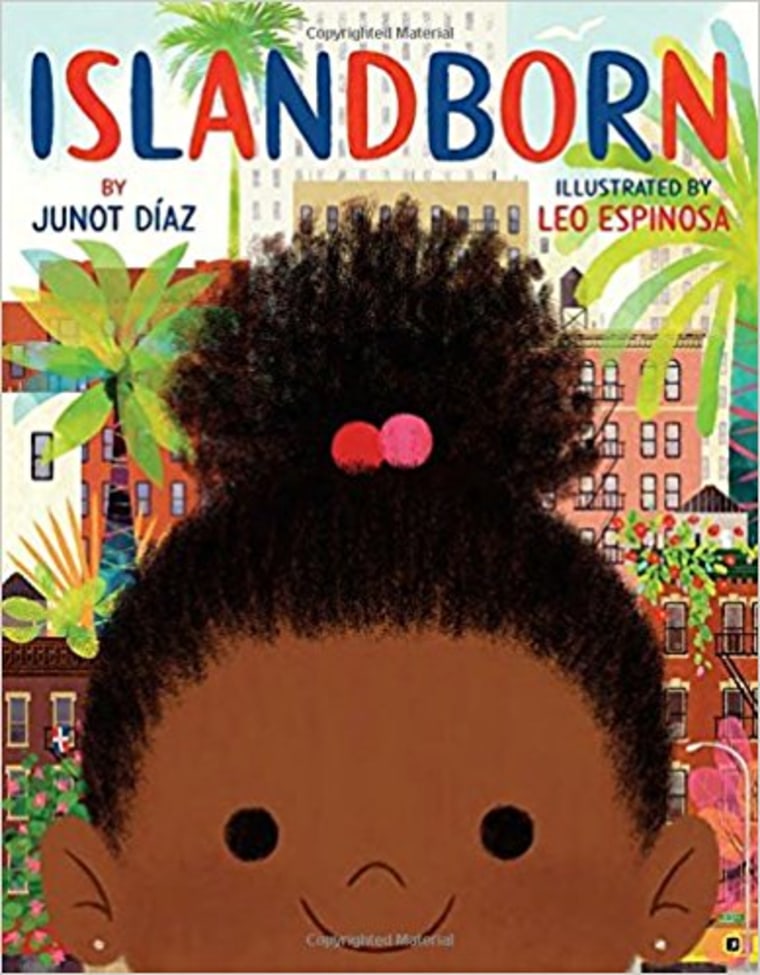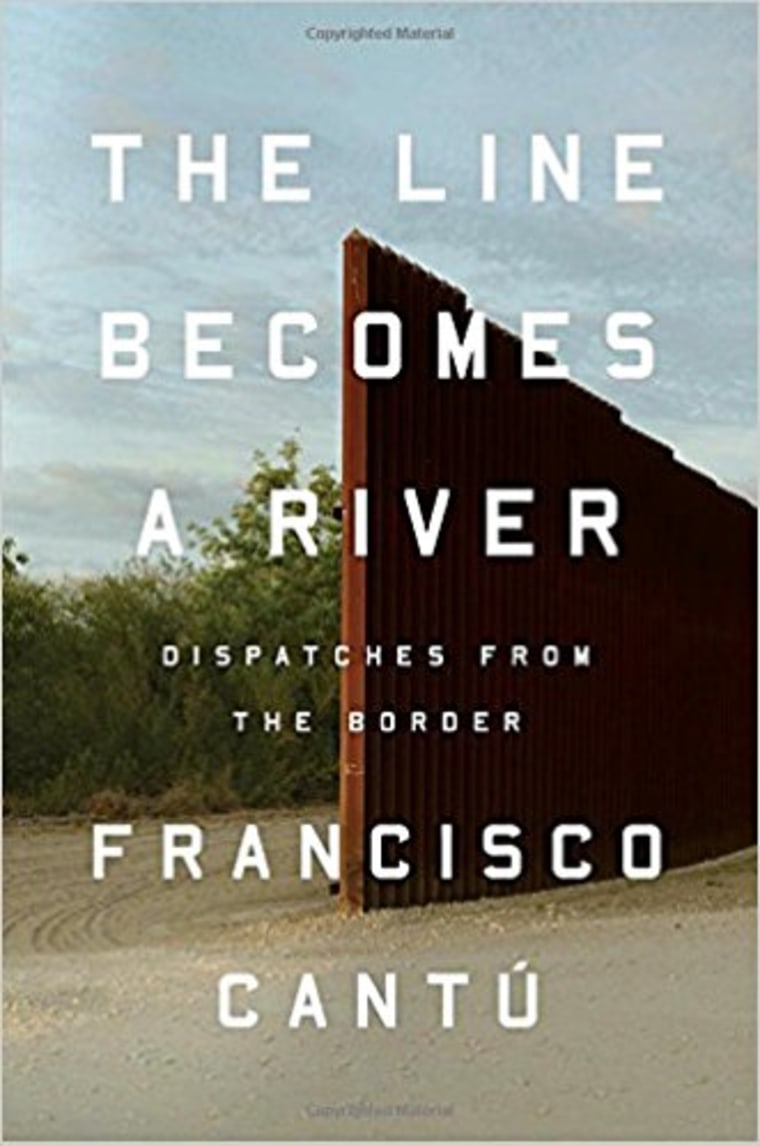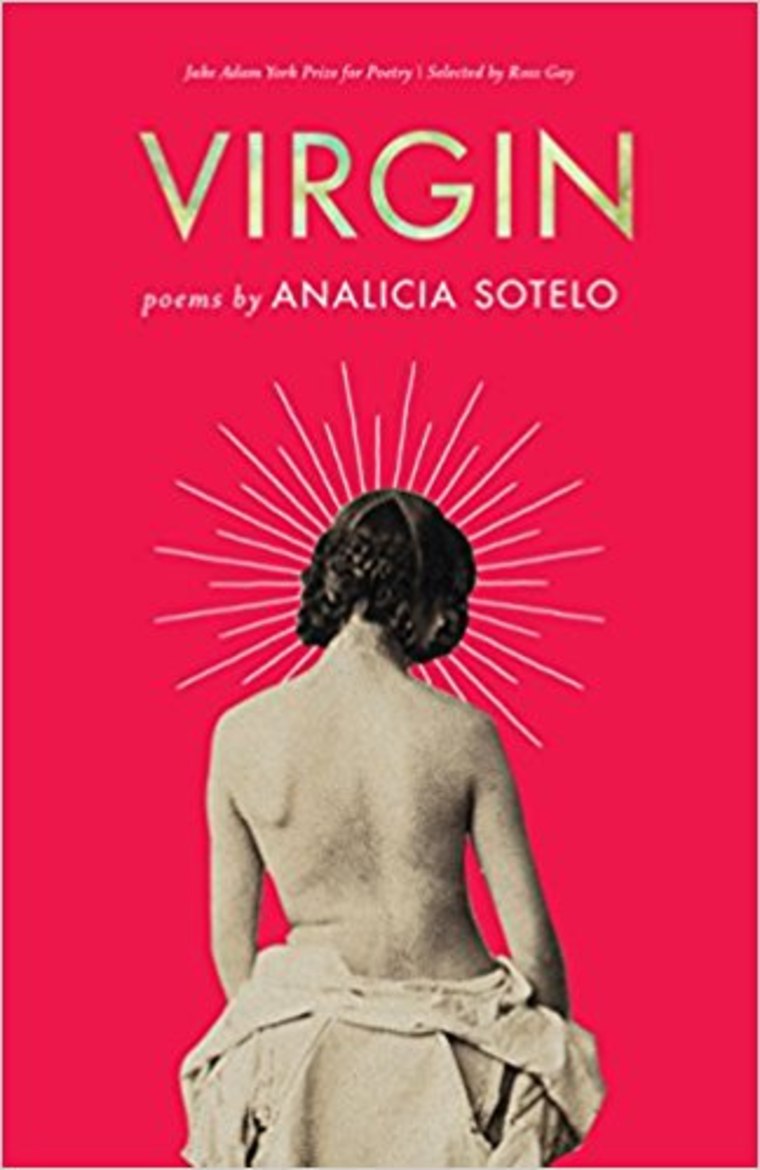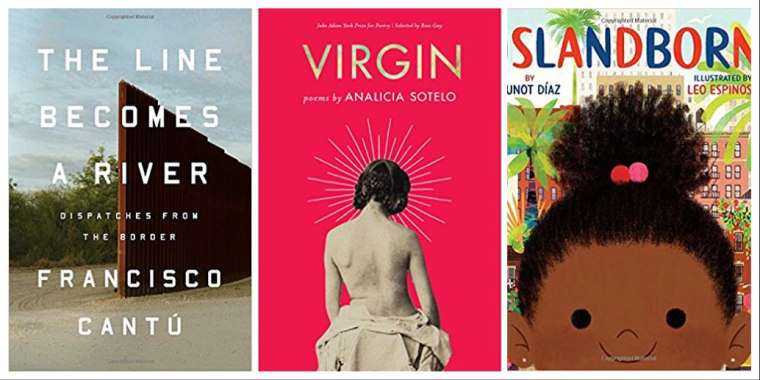For book lovers, spring 2018 has arrived. Publishing catalogs are out, booksellers are stocking the shelves and authors are deep into their promotional speaking tours. Three notable titles by Latino authors, including Pulitzer-prize winning Junot Díaz's first children's book, are getting people talking and making waves. These books resonate as they tackle a homeland's tangled history, the complex observations of a former Border Patrol officer on immigration and the journey of asserting female sexuality.

1. Islandborn by Junot Díaz, illustrated by Leo Espinosa (Dial Books for Young Readers).
The celebrated Dominican American fiction writer and Pulitzer Prize winner is about to be inundated with praise for his debut as a children’s picture book author. Islandborn tells the touching story of Lola, a child of immigrants in a classroom full of kids like her. But unlike her peers, she has no memory of her family’s homeland, having been brought to the U.S. from the Dominican Republic as a baby. This presents a challenge for Lola when her teacher asks the students: “draw a picture of the country you are originally from.” But Lola is a resourceful problem-server—she will “talk to everyone who does remember” and draw their memories.
As a book exploring the cultural components of the Caribbean, Lola’s search yields expected results: music, dance and food, such as mangoes “that are the size of your head and so sweet.”
But Díaz doesn’t shy away from the less appealing truths of the Dominican Republic, like hurricanes, and the story of “the monster” who fell upon the island. To provide an age-appropriate introduction to the country's Rafael Trujillo’s 30-year reign of terror, the late dictator remains unnamed, yet illustrated by Espinosa as a gigantic bat-like creature wreaking havoc on the population. Thankfully, Lola also learns that heroes, “smart young women” like her, rose up and defeated the monster.
The specificity of this historical reference makes it clear that this book is a special gift from the author to the Dominican community, a community rarely seen in American children’s books. To the rest of the readers, he offers an opportunity to discuss the complexities of the Caribbean experience lovingly depicted in Lola’s completed homework assignment: unlike her peers, she doesn’t show up with one picture, but with an entire book of drawings.
It is also worth noting that Espinosa’s illustrations are superb. Espinosa complements Díaz’s immigrant narrative with multi-ethnic representations of Lola’s peers, her teacher, and various members of her neighborhood. A multicultural environment comes through naturally and effortlessly. And Lola, a bright young protagonist with dark skin and kinky hair, personifies black girl ingenuity, creativity, and pride. The book will also be available in a Spanish edition bearing the title Lola.

2. The Line Becomes a River: Dispatches from the Border by Francisco Cantú (Riverhead Books).
Being raised in the American Southwest by a mother who acknowledges her Mexican ancestry doesn’t stop the 23-year-old Cantú from joining the Border Patrol. His mother warns him: “you are stepping into a system, an institution with little regard for people.” Yet Cantú resists, refusing to see his role as a Border Patrol officer with the same stereotypical lens through which people saw the international border and the stories of those who crossed it.
During his four year tenure, he goes from sympathizing with his colleagues — “These people aren’t joining the Border Patrol to oppress others. They’re joining because it represents an opportunity for service, stability, financial security” — to admitting to their human rights violations: “it’s true that we slash their bottles and drain their water into the dry earth, that we dump their backpacks and pile their food and clothes to be crushed and pissed on and stepped over, strewn across the desert and set ablaze.”
Eventually, the burden of guilt, mixed feelings, and discomforts with his job plague Cantú with nightmares. He quits, takes a job in a coffee shop, and enrolls in a writing program in Arizona, hoping to come to terms with his experience.
Part memoir, the book presents a particular challenge for many readers, especially in the Latino and immigrant community: how does one negotiate the humanization of a profession during this political climate in which ICE is seen as a constant threat and whose actions are perceived as dehumanizing?
Cantú, however, doesn’t set out to seek redemption for his former profession; he steps aside so that the troubled borderlands speak for themselves through a series of encounters and discoveries. The dispatches in question appear in the form of historical information, testimonies from fellow Border Patrol officers and anecdotes about the people they detain and deport, plus startling facts about the methods of those engaged in human trafficking and holding people for ransom—an “unintended consequence” of an effective policing of the border.
Towards the end, readers might scoff at Cantú’s change of position when José, an undocumented co-worker at the coffee shop, returns to Mexico on a personal mission and is unable to get past a more aggressive border security. Cantú befriends his family and even writes a letter of support at his hearing, to no avail. But here’s where Cantú demonstrates who truly belongs at the center of the narrative when, once again, he steps aside, this time so that José may speak for himself. José’s personal story is exquisitely nuanced and explains the conflicted journey of a border crosser with an impressive level of compassion, self-reflection, and conviction in only 10 pages.
The Line Becomes a River certainly generates more questions than it answers and offers no solutions to the problems it identifies, but it does manage to piece together a fractured landscape that explains “how a person can become lost in a job, how the soul can buckle.”

3. Virgin: Poems by Analicia Sotelo (Milkweed Editions).
Latina writers are at the forefront of cutting edge literature in the U.S. Last year, Carmen María Machado and Erika L. Sánchez shot to literary stardom with their critically acclaimed works of fiction. This year, the momentum continues with Chicana poet Analicia Sotelo’s dazzling debut.
The provocative title sets the tone for the book’s bravado, its opening poem offers the unapologetic line: “I’m not afraid of sex.” Sotelo then sets out to complicate that statement throughout the book as she speaks to the heartache of crushes, relationships and a longing for freedom from the expectations amplified by religion and culture, a desire fueled by the speaker’s mother, who on one occasion complains: “That’s what marriage is like, you know,/ someone is always well prepared// for the sacrifice, and someone else/ is the sacrifice.”
In another poem, the speaker is having a stressful exchange on a bad date and is reaching for ways out of the situation. She tells her date: “I wish you would grab me and take me to Greece.” But since there is no courtship, not even an invitation, the speaker takes herself to Greece by way of Greek mythology and a series of poems that invoke Ariadne. Through Ariadne, the speaker is able to channel her passion, impart the tough lessons learned about love, and express the struggle of self-preservation.
This is from the poem “Ariadne’s Guide to Getting a Man”: First, you must feel that no one could love you ever./Let the feeling become a veil of black paper./Let the paper become papier-mâché./Make the mâché into marionette monsters./Make the monsters fall in love and scold them/when they disappear down the hallway./When your friends look for husbands/with muscles, horns, and hooves,/make a face like you ate something tart,/like their taste in men is beastly.
Though there are a number of arresting poems about the speaker’s negotiation of her roles as daughter or lover, the most telling ones underscore a woman’s awareness of her own agency, like the poem that imagines the speaker rejecting the ideologies of female sainthood in favor of embracing a flawed image as a radical act of self-acceptance: “When they said Virgin, they meant Version we’ve left behind. I didn’t trust them. So I took her to the rush of the sea. She waded in and waved at me. I turned away. It wasn’t her fault. She wasn’t the shell I was after.”

